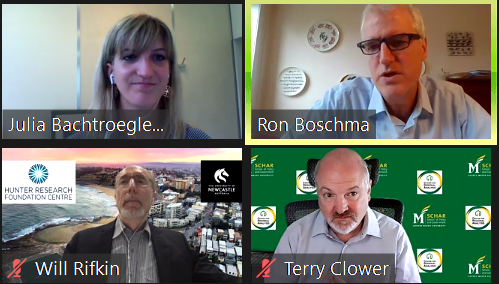Conclusions of the #EURegionsWeekUniversity session: Pandemics, Cities, Regions and Industry

The recording of this session is now available on the REPLAY section of the event web: https://euregionsweek2020-video.eu/video/euregionsweekuniversity-pandemics-cities-regions-and-industry
See the session details on the #EURegionsWeek website
Terry Clower, Director, Center for Regional Analysis, George Mason University, United States.
Will Rifkin, Chair in Applied Regional Economics, Hunter Research Foundation Centre, University of Newcastle, Australia, Australia.
A summary of the session and conclusions
Differences in regional industrial structures affect the economic impact of the pandemic across Europe and worldwide. Terry Clower presented his international team’s Pandemic Risk and Recovery Economic Tool (PRRET). Its current iteration highlights regional economies that are more likely to struggle, e.g., those that are relatively more dependent on travel. In the UK, the recovery index is highest for London’s financial district and lowest for the nearby airport district. The PRRET index can help policymakers to identify where market interventions can speed economic recovery. Ron Boschma analyzed possible effects of the pandemic on the future economic landscape of the EU at a regional scale. He pointed out as crucial the regional distribution of skill-related industries. Local skill sets that can shift among industries enable the reabsorption of the unemployed into regional labour markets. Discussion addressed factors affecting recovery capacity – skills, industries and healthcare capability.
A take-away message
The European Committee of Regions found that potential economic impacts of COVID-19 do not fully mirror well-tried regional patterns based on factors such as population density or initial income. A regional presence of (a) skill-related industries and (b) recently resilient industries are likely determinants of a speedy recovery. Further insight can be gained from data on interregional linkages, such as mobility of workers.
“If we want tools to help us toward a pandemic recovery and a building of resilience in our regions, we need data!” – Terry Clower (PRRET)
“There is a need for collected data and research to be open to the broader community as a means to engage, collaborate and recover together.” – Will Rifkin (PRRET)
“The local presence of skill-related industries is crucial for the resilience of regions: they have a potential to dampen negative effects of the pandemic while they contribute to the recovery of regions because they enhance new growth paths.” – Ron Boschma (Utrecht University)
Additional links
EU annual regional and local barometer: https://cor.europa.eu/en/our-work/EURegionalBarometerDocs/4370-Barometer%20optimized.pdf
The #EURegionsWeekUniversity Webinar Series was organised by the European Commission, Directorate-General for Regional and Urban Policy (DG REGIO) and the European Committee of the Regions (CoR), advised by the Regional Studies Association European Foundation (RSA Europe), and with the cooperation of the European Regional Science Association (ERSA) and the Association of European Schools of Planning (AESOP).
